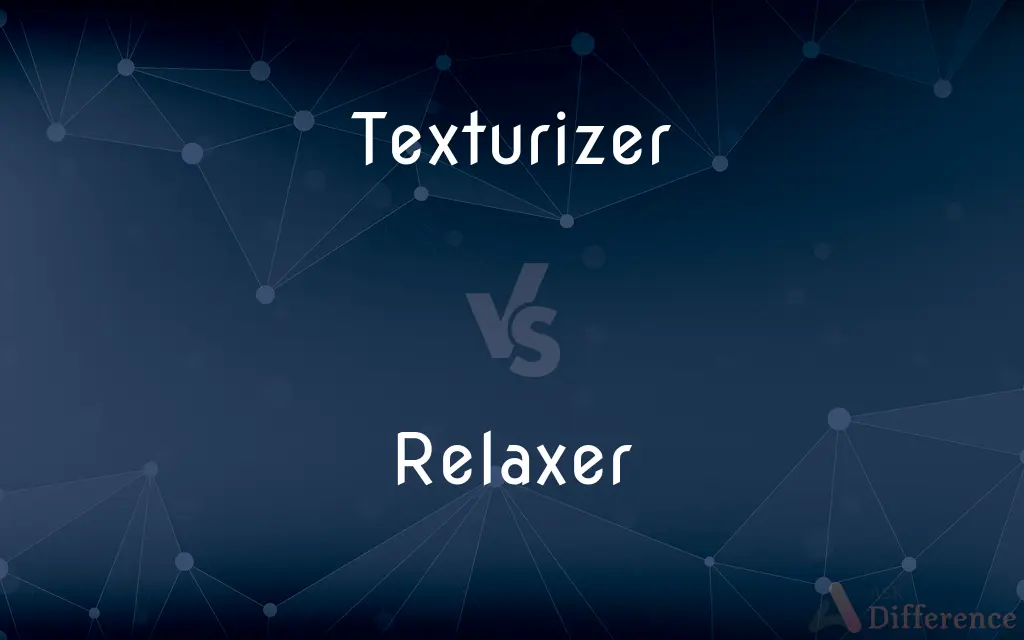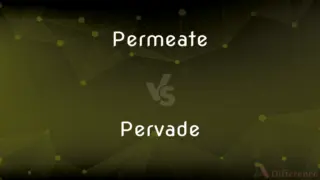Texturizer vs. Relaxer — What's the Difference?
Edited by Tayyaba Rehman — By Fiza Rafique — Updated on September 29, 2023
Texturizer loosens natural curls to enhance texture, while Relaxer straightens curly hair by breaking down hair bonds.

Difference Between Texturizer and Relaxer
Table of Contents
ADVERTISEMENT
Key Differences
Texturizer and Relaxer are both chemical treatments applied to hair, especially common among people with curly or coily hair types. A Texturizer works by loosening the natural curl pattern, giving the hair more defined and manageable curls. On the other hand, a Relaxer is used to straighten curly hair by breaking down the hair’s natural bonds.
The primary objective of a Texturizer is not to straighten the hair but to give it a softer, more defined texture. Relaxer, in contrast, aims to provide a straight look, eliminating most, if not all, of the curl.
The chemical composition of both Texturizer and Relaxer might be similar, often containing lye or no-lye formulas. However, the strength and processing time differ. Texturizers are typically left on the hair for a shorter period than Relaxers, which are more potent and require longer processing times.
When it comes to maintenance, hair treated with a Texturizer might require less frequent touch-ups than hair treated with a Relaxer. This is because Texturized hair retains some of its natural curl, blending with new growth, while Relaxed hair shows a clear demarcation between treated and new growth.
Potential damage is a concern with both treatments. Texturizers and Relaxers, if not used correctly, can weaken hair, making it prone to breakage and damage. Therefore, professional application and proper aftercare are essential for both.
ADVERTISEMENT
Comparison Chart
Primary Purpose
Loosens natural curls for enhanced texture.
Straightens curly hair by breaking down hair bonds.
Processing Time
Shorter duration on the hair.
Longer duration for a straighter result.
Chemical Composition
Lye or no-lye formulas, but less potent.
Lye or no-lye formulas, usually more potent.
Maintenance Frequency
Less frequent touch-ups.
More frequent touch-ups required.
Potential Damage
Can weaken hair if misused, but generally less damaging than relaxers.
Can significantly weaken hair if misused.
Compare with Definitions
Texturizer
A chemical treatment that loosens natural curls.
She used a Texturizer to enhance her wavy hair.
Relaxer
A product that breaks down the hair's natural bonds.
The Relaxer transformed her curly locks into straight strands.
Texturizer
A treatment typically left on the hair for a shorter time.
The Texturizer only needed five minutes to process.
Relaxer
A chemical treatment used to straighten curly hair.
She applied a Relaxer to achieve a sleek look.
Texturizer
A milder alternative to hair straightening.
She opted for a Texturizer instead of going completely straight.
Relaxer
A treatment that gives a permanent straight appearance.
Her hair remained straight for months after using the Relaxer.
Texturizer
A product that gives hair a softer, more defined texture.
The Texturizer made her curls pop and look more defined.
Relaxer
A solution for those desiring pin-straight hair.
She always wanted straight hair, so she chose a Relaxer.
Texturizer
A method to make curly hair more manageable.
After using the Texturizer, her morning routine became easier.
Relaxer
A potent formula that requires precise application.
It's essential to follow instructions when applying a Relaxer.
Texturizer
To give a desired texture to by a special process
Texturize polyester yarn.
Relaxer
A relaxer is a type of lotion or cream generally used by people with tight curls or very curly hair which makes hair easier to straighten by chemically "relaxing" the natural curls. The active agent is usually a strong alkali, although some formulations are based on ammonium thioglycolate or formaldehyde.
Texturizer
Something added to food to change its physical texture.
Relaxer
One that relaxes, as a chemical solution used on tightly curled hair to soften or loosen the curls.
Texturizer
(computer graphics) A program or process that applies a visual texture.
Relaxer
Any agent that produces relaxation.
Music is a good relaxer.
Relaxer
(cosmetics) A cream or lotion that loosens curls in the hair to aid straightening.
Relaxer
A person who relaxes.
Relaxer
Any agent that produces relaxation;
Music is a good relaxer
Common Curiosities
Is a Texturizer less damaging than a Relaxer?
Generally, yes. Texturizers are milder and left on the hair for a shorter time.
How often should one retouch with a Texturizer?
Less frequently than a Relaxer since some natural curl remains.
Can men use a Texturizer?
Yes, many men use Texturizers to enhance their natural curl pattern.
Does a Relaxer provide a permanent result?
Yes, Relaxed hair remains straight, but new growth will be curly.
Is it essential to condition hair after using a Relaxer?
Absolutely. Conditioning restores moisture and balances the hair's pH.
Can you color your hair after using a Texturizer?
It's best to wait a few weeks to prevent potential damage.
How long should one wait between Relaxer applications?
Typically, 6-8 weeks, but it varies based on hair growth and desired results.
Can you switch from a Relaxer to a Texturizer?
Yes, but it's advisable to wait for the Relaxed hair to grow out or be cut off.
Are there natural Texturizer options?
Some natural products can enhance texture, but they may not provide the same results as chemical Texturizers.
Is it safe to swim after getting a Relaxer?
It's best to wait a few days and always rinse chlorine or saltwater out immediately.
Can both treatments cause hair breakage?
Yes, if misused or not followed up with proper care, both can weaken hair.
Which lasts longer, Texturizer or Relaxer?
Relaxers provide a more permanent result, but Texturizers can last with proper maintenance.
Can a Relaxer be used on any hair type?
While primarily used on curly or coily hair, results vary, and a strand test is recommended.
Should I consult a professional for these treatments?
Yes, especially if you're unfamiliar with the process, to ensure hair health and desired results.
What should I do if my scalp burns during a Texturizer application?
Rinse immediately. If severe, consult a healthcare professional.
Share Your Discovery

Previous Comparison
Permeate vs. Pervade
Next Comparison
Bolsheviks vs. SovietsAuthor Spotlight
Written by
Fiza RafiqueFiza Rafique is a skilled content writer at AskDifference.com, where she meticulously refines and enhances written pieces. Drawing from her vast editorial expertise, Fiza ensures clarity, accuracy, and precision in every article. Passionate about language, she continually seeks to elevate the quality of content for readers worldwide.
Edited by
Tayyaba RehmanTayyaba Rehman is a distinguished writer, currently serving as a primary contributor to askdifference.com. As a researcher in semantics and etymology, Tayyaba's passion for the complexity of languages and their distinctions has found a perfect home on the platform. Tayyaba delves into the intricacies of language, distinguishing between commonly confused words and phrases, thereby providing clarity for readers worldwide.














































